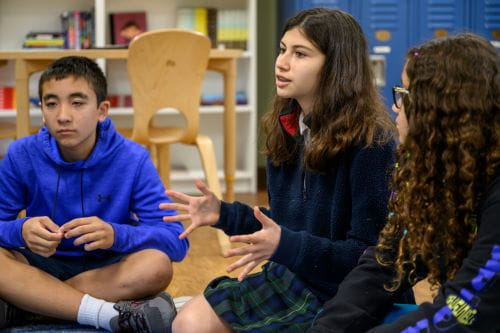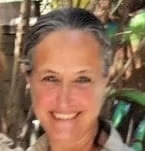Walk into a community meeting in a school or university, church or prison, library or community center, and you may observe a form of dialogue taking place wherein participants develop and exchange points of view through a question-and-answer process that (source):
- stimulates critical thinking
- challenges underlying presuppositions
- draws out and refines underdeveloped ideas
- encourage the consideration of alternative perspectives
Known in different circles as Socratic Dialogue, Socratic Discourse, Socratic Debate, or more colloquially as Socrates Café, this type of discussion is loosely based on the teachings of the fifth century Greek philosopher, Socrates—loosely based because critics point out that the goals and methods of some of these discussions may be inconsistent with the original dialectics of Socrates, whose aim was to continually ask questions until a contradiction was exposed, thus proving the fallacy of the initial assumption.
Elizabeth Garrett, former Harvard Law School professor and former President of Cornell University, writes in a 1998 essay that the Socratic Method is used in law school to help students “learn how to analyze legal problems, to reason by analogy, to think critically about one’s own arguments and those put forth by others, and to understand the effect of the law on those subject to it.” However, Garrett’s more general point, that “Socratic Discourse requires participants to articulate, develop, and defend positions that may at first be imperfectly defined intuitions,” may be more in keeping with the goals of Socratic Discourse as used in schools, including many Montessori Secondary schools.
Dr. Katie Keller Wood, executive director of the Cincinnati Montessori Secondary Teacher Education Program (CMStep), has utilized Socratic Discourse with adolescents in Secondary Montessori programs and with adults in Montessori schools and teacher education programs. She has graciously agreed to talk with us about how it looks in classroom practice.
Cynthia Brunold-Conesa
How do you define Socratic Discourse in terms of its implementation with adolescents, and what are the goals?
Katie Keller Wood
Socratic Discourse is a structured form of classroom discourse, different from a “discussion” or a debate. All three types of discourse can have value, but a Seminar has a specific structure to support its unique goals.
The primary goal of Socratic Discourse, or Seminar, as we often refer to it, is the same as any other activity in a Secondary Montessori classroom: to provide an opportunity to promote what Montessori called a “valorization of the personality.” Other activities, such as field studies, economic experiences, and work cycles all support valorization as well, by providing opportunities for student empowerment, to practice independence and interdependence, and hone their practical life skills. Seminar promotes valorization by giving adolescents the opportunity to practice divergent thinking by discussing and examining philosophical and moral questions. The third plane is an important one for identity exploration. As adolescents discuss these big ideas, they can try on different approaches, change their minds, and hear alternative and challenging perspectives. They learn to agree and disagree with ideas, without attacking or belittling the human being sharing an idea. They see that there can be many perspectives to an issue. Because adolescents are in this stage of intense identity exploration (we often call them “the emergent adults of our species”) and since many perspectives are informed by a person’s cultural background and upbringing, Seminar provides a safe place for adolescents to work out their own feelings and beliefs about the world. Perhaps most importantly, they have a safe place to try on these different ideas, but also to change their minds. Seminar reminds students and adults alike that we are all learning and growing and changing. When we have new information, or a new perspective, we have a responsibility to reconsider our thoughts and beliefs, which may also lead to a change in our actions.
Cynthia
How is the approach you take with adolescents different from our understanding of the classic Socratic Method as defined above by Elizabeth Garrett?
Katie
I’m not as familiar with Garrett’s work, but I think her definition has merit. The only nuanced difference I would offer is that Seminar is, as described above, a safe place to also change one’s mind. This is what makes Seminar different from a debate, where the goal is to “prove” a particular position, to be “right,” or “win” an argument. Seminar, on the other hand, shows many perspectives. And while each student is encouraged to analyze, reason, and think critically about one’s own ideas and those put forth by others, as Garrett describes, the process often unfolds in a more collaborative way. Very often, with the sharing of various ideas, the group arrives to new insights, the likes of which would be unlikely, if not impossible, for someone reasoning alone. Seminar reminds us that we need many perspectives, that everyone has something to contribute.
Cynthia
In The Socratic Method Today (2017), the method is described as “more than a technique … require[ing] a range of devices to access the motivations of students so they can become active learners.” In what way, if at all, does this description reflect your work with adolescents?
Katie
Without knowing which “devices” are referenced, I do agree that Seminar taps into the human interests (and thus motivation) of adolescents, and is an outstanding vehicle for self-creation, critical thinking, expressions of emotional intelligences, and more. So yes, I would agree with the idea of Seminar promoting “active learning.”
Cynthia
In an AMS Learning webinar, Socratic Discourse: Preparing the Environment for Thinking, Listening, and Speaking, your colleague, Barb Scholz, practicum director emerita of CMStep, discusses preparing the materials, space, teachers, and students for Socratic discussion. Can you elaborate on what this preparation looks like?
Katie
It can vary, but preparation for students involves the teaching of Seminar routines and procedures. Preparation on behalf of the teacher relates to the selection of texts and the development of open-ended questions (the kind that promote divergent thinking, and lead us to examine bigger themes, like justice, friendship, and morality). Preparation of the space and materials has the most variation, but we talk about creating a space where everyone can see/hear each other (a circle) and everyone is (literally) on the same level, and equally valued. Sometimes teachers set out name placards, or have students use last names (especially if the teacher is called by their last name) as other physical reminders of how this discourse varies from a “classroom discussion.”
Cynthia
What is the teacher’s role once the Seminar is underway?
Katie
In a good Seminar, the teacher is prepared with questions that promote divergent thinking, but as students learn the routines, very often the teacher speaks very little. We recommend a goal of not speaking more than a typical student, and when the teacher does speak, it is often to provide an alternative perspective, ask a new question, or to step in. The teacher is still “the first among equals,” and has a responsibility to address inaccuracies, biases, and behaviors that cause harm and/or detract from the learning environment.
Cynthia
Barb also discusses the importance of selecting a text or question that is “open to multiple perspectives on big ideas.” Can you give us an example of a text or question that has been the subject of a Socratic discussion with your students? What is “a big idea?” How is the text or question selected?
Katie
Many factors go into selecting texts and questions. Readability, a text that will hold students’ interest, and texts that offer opportunities for divergent ideas are all important to consider. Fiction is a great vehicle, but not the only one. I’ve seen incredible Seminars in math and science classrooms that focus on questions like:
- What does it mean if the same data can be presented in different ways, such that different conclusions are likely to be drawn? Are “facts” always neutral? What responsibilities do mathematicians and statisticians have when presenting data?
- Should HeLa cells continue to be used? What, if anything, should be done to address any injustices that occurred in the past with tissue samples taken and subsequent use of these cells? What ethical principles should guide future scientists?
It is also possible to have Seminars on pieces of art: visual, musical, cinematic, etc. But usually, we start with texts.
Cynthia
How are students assessed on their participation in Seminar?
Katie
This can vary significantly. Some secondary classrooms utilize traditional letter grades, many do not. What matters most is that students reflect on their own preparation and participation (individually and/or collectively) in addition to teacher feedback. Teachers often map or chart the Seminar participation of students, noting various Seminar behaviors. These might include basic items, such as how many times students spoke up, but also more nuanced behaviors, such as citing text to support an argument, asking a thought-provoking question that moves the conversation forward, or looking to include everyone in the conversation.
Cynthia
Have you noticed changes in your students’ thinking, in their overall approach to discussions and problem-solving in general, after extended practice with Socratic Discourse? If so, can you elaborate?
Katie
Definitely. With regular Seminar practice (I had Seminars approximately once per week), I found that students engaged in closer reading of texts, were more confident in using evidence from text to support an opinion, were more flexible in their thinking, and, most importantly, grew in their appreciation of diverse perspectives. Seminar offers a type of discourse where we grow together, rather than focusing on who is “winning” or “losing” an argument, where changing our minds when presented with new ideas is supported and valued.
Cynthia
What advice would you give teachers who are interested in implementing Socratic discussion with their students, but don’t know where to begin?
Katie
That’s a great question. I believe that all AMS-affiliated TEPs offering a Secondary credential offer specific training in Seminar-types of discussions, so I assume this question would then be for untrained teachers of adolescents or teachers at another level. And since I am not an expert in Elementary education, I will leave that for others to address. If an untrained teacher of adolescents would like to implement Seminar, I would encourage them to review Barb’s webinar, seek out the trained faculty members at their school, reach out to training programs for targeted professional development, or (best of all) come to training! As an aside, we’ve also seen administrators and teacher-leaders make great use of this kind of discourse within their school communities.
The author wishes to thank Dr. Keller Wood for sharing her time and expertise on the implementation of Socratic Discourse with adolescents in the Montessori classroom. Readers can learn more about the distinction between debate, discussion, and dialogue here.
Reference
Trepanier, Lee. (2017). The Socratic method today: student-centered and transformative teaching in political science. New York: Taylor & Francis Group.
About the Author
The opinions expressed in Montessori Life are those of the authors and do not necessarily represent the position of AMS. On this page |


